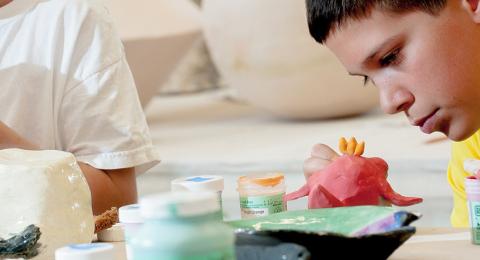The Studio Arts Education major at UNH prepares students for careers as art educators in public schools. In the first four years, students earn their studio art degree, working with diverse media and studying drawing, painting, photography, ceramics, sculpture and more. A fifth-year internship fulfills teacher certification requirements for New Hampshire and most other states. The program is enriched by the Paul Creative Arts Center, the nearby arts community in Portsmouth, and Boston's fine art museums. Students also engage with global artists and historians through the Visiting Artists & Art Historians program.
What is studio art/art education?
If you’re interested in teaching art, our degree with the option in studio art/art education will prepare you for a career as an art educator in public schools. In the first four years, you’ll immerse yourself in the studio art program, earning a bachelor’s degree while gaining broad experience working with diverse media. You’ll have the opportunity to study art forms such as drawing, painting, photography, printmaking, ceramics, sculpture and woodcraft. A fifth-year internship satisfies the initial certification requirements for teachers of art in public schools in New Hampshire and most other states.
Why study studio art/art education at UNH?
In addition to the Gallery of Art and Paul Creative Arts Center on campus and the rich artistic community of Portsmouth just minutes away, the fine art museums of Boston are within an hour’s drive. You’ll meet and learn from artists and historians from around the world through our Visiting Artists & Art Historians program. Your education coursework will be handled expertly by our Education Department, which has been teaching teachers for more than 100 years.
Potential careers
- Art teacher
- Commercial artist
- Designer
- Museum educator
- Program director
Curriculum & Requirements
The program in art education is organized into a five-year, teacher-education sequence. This curriculum is designed to prepare teachers of art in the public schools. The satisfactory completion of the B.A. studio art curriculum for art education students and required education courses, in conjunction with the fifth-year internship, will satisfy the initial certification requirements for teachers of art in the public schools of New Hampshire and in most other states. These requirements may change by the time students apply for certification and the students are required to fulfill the then-current requirements. Art education students may take accredited crafts courses at other institutions as art electives.
A portfolio is required for acceptance to the studio art/art education option.
Degree Requirements
All Major, Option and Elective Requirements as indicated.
*Major GPA requirements as indicated.
Major Requirements
- Students must complete a minimum of 14 courses (56 credits) for the major requirements.
- Major courses must be completed with a minimum grade of C in each course. The required minimum overall GPA in major coursework is 2.0.
- Studio art/art education majors may use two major-required courses to satisfy two Discovery category requirements.
| Code | Title | Credits |
|---|---|---|
| Required Courses | ||
| Core Foundation | ||
| ARTS 501 | Introductory Ceramics | 4 |
| ARTS 510 | Principles of Design | 4 |
| ARTS 532 | Introductory Drawing | 4 |
| ARTS 567 | Introductory Sculpture | 4 |
| Core Supplemental | ||
| Select one 500/600-level 2D course from the following: | 4 | |
ARTS 536 | Introduction Printmaking: Intaglio | |
ARTS 546 | Painting Design I: Perceptual Painting and Color Theory | |
ARTS 640 | Drawing Workshop | |
| Select one 500-level Photography course from the following: | 4 | |
ARTS 551 | Introduction to Darkroom Photography | |
ARTS 552 | Introductory Digital Photography (recommended) | |
| Concentration Courses | ||
| Select four (4) Studio courses in a concentration at 500-600-700 level (see concentration courses below) | 16 | |
| Advanced Studio Seminar | ||
| ARTS 780 | Advanced Studio Seminar | 4 |
| Art History Courses | ||
| Select one course from the following: | 4 | |
ARTH 474 | Introduction to Architectural History | |
ARTH 480 | Introduction to Art History | |
ARTH 485 | Introduction to Global Art History | |
| Select one 600-level elective from the following: | 4 | |
ARTH 674 | Greek Art and Architecture | |
ARTH 678 | Romanesque and Gothic Art | |
ARTH 681 | Early Renaissance Art | |
ARTH 682 | The High Renaissance | |
ARTH 686 | Sex and Sensuality in 18th-Century Art | |
ARTH 688 | Histories of Late 19th & 20th Century European Modernism | |
ARTH 694 | Vision and Modernity: From Panorama to Early Film | |
ARTH 695 | Topics in Art History | |
ARTH 795 | Understanding Art History: An In-Depth Overview | |
| Select one 600-level elective with depth of content in 20th-21st Century art from the following: | 4 | |
ARTH 688 | Histories of Late 19th & 20th Century European Modernism | |
ARTH 694 | Vision and Modernity: From Panorama to Early Film | |
| In addition to the above, other courses are required for teaching certification. | ||
| Total Credits | 56 | |
Concentration Courses
- Students select four concentration courses total (16 credits).
- Minimum of three 600-700 level studio courses.
- No more than one of the following: a 500-level studio course (select from ARTS 501 , ARTS 525, ARTS 536, ARTS 546, ARTS 551, ARTS 552, ARTS 596), ARTS 598, a 600-700 level art history (see selection of courses in art history requirement above), or ARTS 600 Internship in Studio Art (with approval).
- January Term and Summer online courses cannot be used.
| Code | Title | Credits |
|---|---|---|
ARTS 601 | Ceramics Workshop (may be repeated) | |
ARTS 610 | Principles of Typography | |
ARTS 611 | Animation and Motion Design | |
ARTS 612 | Interaction & Game Design | |
ARTS 613 | Design and Place | |
ARTS 614 | Design and People | |
ARTS 625 | Wood/Furniture Design Workshop (may be repeated) | |
ARTS 636 | Printmaking Workshop (may be repeated) | |
ARTS 640 | Drawing Workshop | |
ARTS 660 | Painting Workshop | |
ARTS 651 | Photography Workshop (may be repeated) | |
ARTS 667 | Sculpture Workshop (may be repeated) | |
ARTS 780 | Advanced Studio Seminar | |
ARTS 796 | Independent Study: Studio Art (K: Wood Design, may be repeated) |
Capstone
The Discovery Program capstone requirement will be fulfilled by completing a capstone project that reflects the training received, and personal artistic growth made, throughout the student’s years of study at UNH. The capstone project includes participation in the BA/BFA Senior Exhibition in the UNH Museum of Art in April-May. Students will submit a minimum of 5 (or the equivalent what would be the equivalent of 5) recent works for faculty to review and select for the exhibition. At the review a written artist statement and verbal explanation of the work must also be presented.
Candidates for a degree must satisfy all of the University Discovery Program requirements in addition to satisfying the requirements of each individual major program. Bachelor of arts candidates must also satisfy the foreign language proficiency requirement.
Program Learning Outcomes
Introductory (500) Level:
- Basic skillset in a particular arts discipline
- Working knowledge of the tools and materials used in a particular arts discipline
- Basic understanding of analytical thinking when making and talking about art
- Demonstrate development of artistry
Intermediate (500/600) Level:
- Demonstrate development of artistry and skill set in a range of artistic disciplines
- Demonstrate knowledge of tools and materials beyond the basics
- Deeper ability to discuss and analyze works of art
- Ability to verbalize intent in a particular work of art
- Ability to research particular artists
- Ability to declare an area of concentration for advanced in a particular arts discipline
Advanced (600/700) Level:
- Demonstrate a high level of artistry
- Ability to work independently
- Develop and Demonstrate an individual sensibility
- Ability to understand and verbalize intent in a work of art
- Ability to construct a professional capstone portfolio or thesis
- Demonstrate in-depth familiarity with a range of artistic movements both historical and contemporary




